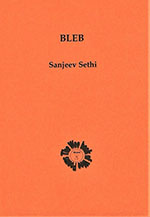Sanjeev Sethi’s fourth collection of poetry, Bleb, depicts the transcendence of human soul from self-love to spirituality and detachment. Bleb explores varied aspects juxtaposed with love—sexual exploration, paternity, spirituality, and death. The providential merges with the personal, the everyday with the unusual, offering life lessons to artists and lay readers alike.
Bleb opens with ‘Medic’. Its beginning reminds one of Ted Hughes’ ‘The Thought Fox’, as ideas, or ‘words cycle towards’ the poet. The poem quickly shifts to a sexual tease—‘words lap dance with a tumescent dash’; and finally takes on a birthing metaphor—‘The first draft is born’. Poetic creation is about birthing, as well as nursing and nourishing. Poets are sometimes doctors aiding birth, sometimes nurses nourishing and pruning ideas, sieving them to carve out drafts. Often, poets are ruthless midwives, discarding indited pieces—‘Summon the accoucheur for stillborns’. ‘Medic’ is a commentary on both slow emergence of ideas, and the labourious editorial processes. Sethi further defines poetry in ‘Offing’—‘A poem isn’t a fable or folktale. Its task is to temper with images and ideas that create one’s fantasy or factuality….’
‘Offing’ juxtaposes ideas on poetry with the poet’s desire to belong in nature. But, the exchange between him and brackens is that of a tease. Use of words like ‘little jig’, ‘fantasy,’ ‘oeillade’ in ‘Offing’ continues the flirtation initiated in ‘Medic’. Desire, alongside pain, is an intrinsic part of birthing, and we have ample references of both in this collection. Sethi has explored the twin concepts of desire and sexuality previously in This Summer and That Summer (Bloomsbury, 2015)—‘Garrison Report’ depicts adolescent memory of windows as ‘porn’.

